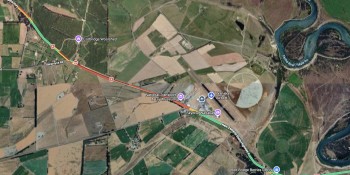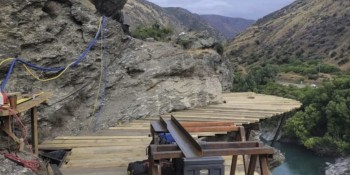Govt's Three Waters revamp: Ten entities instead of four, start delayed by two years

Prime Minister Chris Hipkins and Local Government Minister Kieran McAnulty are setting out the government's updated Three Waters strategy.
Hipkins sent Labour's initial plan - to transfer local control of water to four new mega-entities - back to the drawing board after a fierce backlash from many councils.
At the briefing, Hipkins says 25 percent of wastewater plants are running on expired consents and in 2020-2021 New Zealand experienced 2750 dry weather wastewater overflows.
He says this is a major cost of living issue that is going to face New Zealanders in the coming decades.
"We can't simply kick the can down the road and avoid making the tough decisions but we have also listened to the feedback that we've received on the water reform proposals that we've had to date.
"We've had the feedback that the solution that we put forward was too centralised and didn't have enough provision for local voice."
He says the government believes the 10-entity solution "strikes the right balance between ensuring cost savings in the delivery of water infrastructure, while also ensuring that those water entities are strongly grounded in their local communities".
"Every council will be represented around the table in guiding those local water entities. Households will still see significant savings."
He says those arguing against the reforms "are effectively arguing for higher rates and higher cost of living for New Zealanders".
McAnulty says the "guts of it" is that councils are individually at their debt cap or if not, their communities can't afford the higher rates.
"So individually they're stuck. If they try to work together through a CCO (council controlled organisation) like Wellington Water, there's a limit to that because the debt that councils hold on their balance sheet still stays there, and if they try and do shared services it doesn't allow councils to be able to borrow the money they need to be able to fund this."
He says the water infrastructure will be funded by borrowing, it's about making that borrowing more affordable.
"We explored all the alternatives put forward through Communities 4 Local Democracy, or even the National Party, and it [sic] didn't stack up. The only way to make this work financially for ratepayers and local communities is to have a separate entity that's still owned by the council but is run independently by an independent governing body.
"That's the only way that credit agencies will allow them to borrow to the extent that they needed."
He says after his visits to all local councils, some said they had never had a minister visit them before but all said they wanted their local voice to be included.
"If we went for 16 entities we wouldn't have got the scale required to allow for the borrowing that is needed," he says, and would have left some councils "totally isolated, set up for disaster, and I couldn't in good conscience propose that to Cabinet".
'It's not co-governance' - PM
Answering media questions, Hipkins says the 50-50 policy for mana whenua and the councils on the representative groups, "it's not co-governance, and it wasn't co-governance".
"There will be regional advisory groups that will include representation from mana whenua and of course representation from every local council.
"The advisory groups are only one form of that, there's also an ability for example for the Te Mana o Te Wai statements, and we've introduced an equivalent for other significant interested parties in water use to also have a say in that."
The prime minister says the modelling suggests fewer groups lead to greater efficiency, "but this is still going to be significantly more efficient than what we're doing now".
McAnulty says only one councillor - in New Plymouth - raised co-governance on his tour of the 55 councils.
"The fact of the matter is that local councils work closely with mana whenua, they have similar arrangements anyway."
Further details from today's announcement
The government's Three Waters project is moving from four entities to 10 with its start date pushed out by two years.
Ironically, its move to rebrand the project as the "Affordable Water Reforms" comes with a bigger pricetag for ratepayers than under the old model.
The government says the change will mean individual councils will have a bigger say over the water service entities.
Statements provided to explain the shift also do not address whether it will include any changes to the 50-50 co-governance policy, which would see mana whenua given half the membership of the strategic oversight groups which appoint the board.
In a statement, Local Government Minister Kieran McAnulty said the entities would also start delivering water services from 1 July 2026 at the latest, two years after the 2024 start date promised by his predecessor.
Hipkins had tasked McAnulty - who took over the portfolio from Nanaia Mahuta after Hipkins became prime minister - with taking the reform programme back to the drawing board after fierce backlash from councils and political opponents.
The reforms are aimed at helping curb the costs of upgrading water infrastructure across New Zealand, which was reviewed by the previous National government after the 2016 Havelock North campylobacter outbreak.
The review found annual water rates bills would need to increase by up to $9000 by 2051 to pay the up to $185 billion bill for the necessary upgrades and maintenance, as well as preparing for climate change. Today's announcement has an update to that figure, suggesting increases of up to $9730 by 2054.
The government now says its 10-entity solution will cut on average up to $5400 off that bill, but that compares to the up to $8200 in estimated savings by 2051 claimed by Nanaia Mahuta under the four-entity model in June 2021.
This means the new model would be delivering what appears to be up to $2800 less in savings to households, but the comparison may not be direct.
Some districts would see much greater savings than the $5400 figure - such as Waitomo, expected to see what would be a $21,500 water bill cut by $18,730 under the reforms, an 87 percent cut.
McAnulty talked up the benefits of moving to a 10-entity plan.
"Under our proposal to establish 10 entities, New Zealand households will still make big savings," he said.
"The feedback has been overwhelmingly clear that our water infrastructure deficit needs to be addressed now if we're to save households from ballooning bills that will make water unaffordable, but also that the reform programme must be led at a regional level - we have listened closely and absolutely agree.
"By extending the number of publicly owned water entities to 10, every district council in the country will have a say and representation over their local water services entities through regional representative groups."
He said these representative groups would include "a partnership between council representatives and iwi/Māori that will provide strategic oversight and direction to the entities", but the initial statements did not clarify whether there would be changes to the contentious 50-50 co-governance aspect.
Under the old model, this would see mana whenua granted half the seats on the regional representative groups, the other seats reserved for council representatives.
As before, the representative groups for the 10 entities will offer strategic oversight over a professional board which runs the entity, appointed based on competence and skill.
Concerns about ownership rights also go unanswered, with the old model which sees councils owning the entities - which in turn own the assets like pipes and reservoirs - through a shareholding structure, apparently unchanged.
McAnulty said he had listened to the feedback from councils and had been working closely with local government leaders ahead of the decision.
"These reforms are absolutely essential. Leaving things as they are will mean an unaffordable rate bill," he said.
About 30 councils banded together under the Communities 4 Local Democracy (C4LD) group to oppose the government's proposals, and in a statement said they were disappointed the government had refused to make meaningful changes.
They said it had been turned into an election issue, rather than seeking consensus.
C4LD co-chairs Helen Worboys and Dan Gordon said New Zealanders would see it was the same plan with a different name.
"Simply adding more entities and changing the name is a desperate attempt to save this plan and attempt to show they've done something with the $100 million they've sunk into this process so far," they said.
"Unfortunately, instead of listening to what communities are asking for, the government once again thinks it knows better and is serving up a reheated version of the same unpalatable, unpopular plan."





















